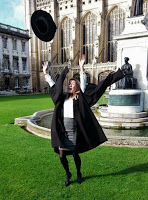PhD Defenses around the world: A viva in linguistics at Cambridge
 Today, I have invited Dr. Alison Edwards to discuss her experience at her viva. Alison is originally from Australia but has lived in Europe since 2005. She is now based in Amsterdam and is the author of English in the Netherlands: Functions, forms and attitudes. She has a PhD in Linguistics from the University of Cambridge, an MA in Applied Linguistics and undergraduate degrees in Journalism and German Studies. In addition to her linguistics research, Alison runs a translation and editing business and blogs at www.theroguelinguist.com. Follow her on twitter or facebook.
Today, I have invited Dr. Alison Edwards to discuss her experience at her viva. Alison is originally from Australia but has lived in Europe since 2005. She is now based in Amsterdam and is the author of English in the Netherlands: Functions, forms and attitudes. She has a PhD in Linguistics from the University of Cambridge, an MA in Applied Linguistics and undergraduate degrees in Journalism and German Studies. In addition to her linguistics research, Alison runs a translation and editing business and blogs at www.theroguelinguist.com. Follow her on twitter or facebook.
The preparations for my viva were not entirely smooth.
In the UK the viva is a closed session, just you and your two examiners, an internal one (from your own department) and an external one (flown in from Germany, in my case). When my supervisor told me who my internal examiner was, my first thought was: how strange. She works on the history of French, whereas I work on contemporary English. Still, I went to the library and studied all her books.
But I’d got my wires crossed somehow – either my supervisor gave me the wrong name, or I just remembered it wrong – because the internal examiner turned out to be someone else entirely. I discovered this a few days before the viva. Luckily the point is to discuss your own work, not theirs.
The day itself was sweltering hot, which always comes as a surprise in England, and the viva was held in a tiny top-floor room with windows that didn’t open. My two examiners were behind a desk; I was perched on a seat in the middle of the room where I had to balance my piles of papers awkwardly on my lap.
But they put me at ease from the start – as at ease as you can be in a situation like that – by saying it’s good, it’s going to be fine, we’re just going to have a nice discussion.
The whole procedure lasted just under two hours. I have friends who were grilled for more than five, so I count myself lucky. Nothing extremely challenging came up, but then I was well prepared. I knew there were a few parts in the quantitative sections that might give rise to questions so I had practised answering those, and had brought typed notes with examples that I could walk them through.
Generally, I just tried to be friendly and speak calmly and thoughtfully. Like when answering questions during a talk, I think the worst move you can make is to be defensive.
At the end the internal examiner said: since summer is coming up and you won’t otherwise find out for months, we’ll be nice and tell you the verdict now. We’re recommending your thesis be accepted with no corrections.
It’s hard for me to describe how pleased I was! There are all sorts of possible outcomes, including accept with minor corrections, accept with major corrections, revise and resubmit, or ‘this is so awful we’ll not even permit you to resubmit’ (e.g. in cases of fraud). But accept with no corrections is very rare, so it remains one of the proudest achievements of my life.
Afterwards I dashed across the courtyard to the economics building where my then fiancé was a postdoc, bursting with the news. Then we went into college – we were both based at King’s during our time in Cambridge – where some friends were waiting.
It so happened that another friend was having her viva in virology the exact same day, so we all popped sparkling wine at Bodley’s Court, where the college backs onto the river Cam. It’s possible that I jumped into the river, to the surprise of the tourists punting by.
About five months later was the actual graduation ceremony, which is a very solemn affair with lots of gowns and pomp. My parents were there from Australia, with my husband and my new parents-in-law from the Netherlands – we got married just a few weeks before, so it was a very special time for me.
That night we went to Evensong in King’s chapel, by the famous choir. As always it was beautiful and atmospheric, and I’ll admit that I shed a few tears recalling my first visit to Cambridge, as a backpacker so many years before, when studying in such a place was a dream that seemed so out of reach it was laughable. Cambridge will always remain very close to my heart.

Congratulations Dr. Alison. I am so happy for you. Your sharing is impressive. I am also preparing for my PhD in Linguistics. Yet, I'm still waiting for funding and admission at a certain university.